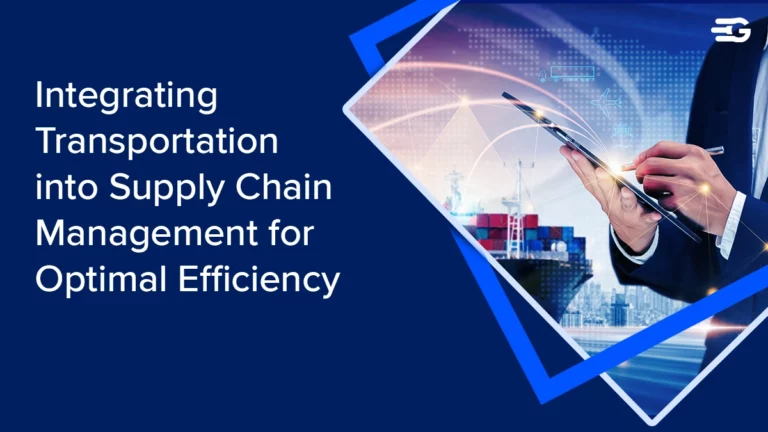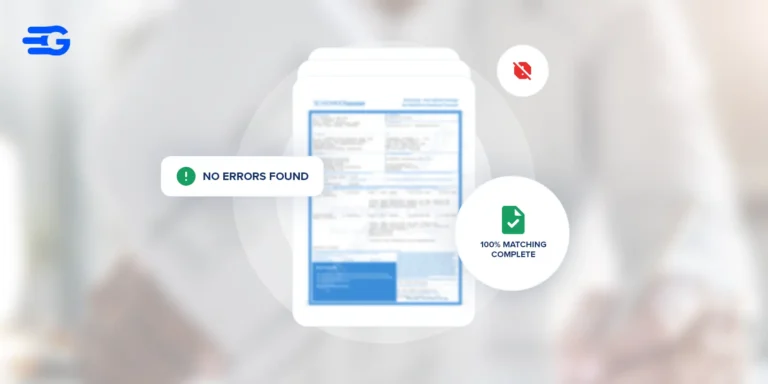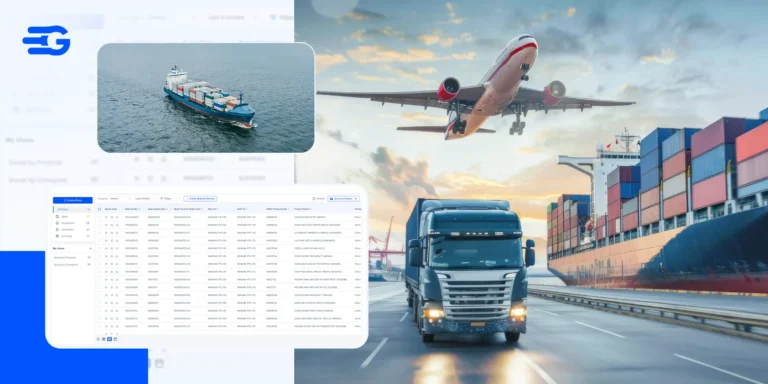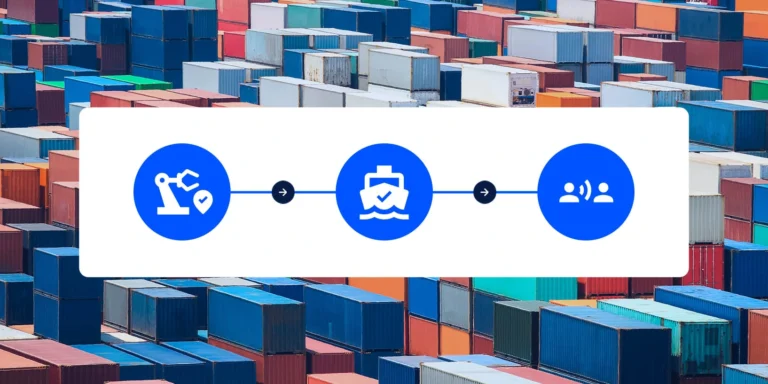How Can TMS Freight Cost Management Optimize Your Supply Chain
Freight cost management is fraught with challenges. Rising fuel prices, unpredictable disruptions, and port congestion can wreak havoc on supply chain efficiency, driving up costs and reducing profitability. Businesses are often left grappling with delays, miscommunications, and unforeseen expenses that disrupt operations.
To tackle these challenges, Transportation Management Systems (TMS) have emerged as indispensable tools. By streamlining freight operations, enhancing visibility, and enabling data-driven decision-making, TMS empowers businesses to reduce costs and improve efficiency.
In this blog, we’ll delve into how you can optimize TMS freight cost management, with a special focus on GoComet’s solutions and its impactful port congestion case study.
What is a Transportation Management System (TMS)?
A Transportation Management System is a comprehensive digital platform designed to manage, streamline, and optimize the movement of goods from origin to destination.
At its core, a TMS freight cost management platform bridges the gap between planning and execution by integrating advanced technologies such as real-time data analysis, automation, and predictive analytics.
Beyond simplifying logistics, a robust TMS offers actionable insights, enhanced visibility, and the ability to respond swiftly to unforeseen disruptions. These capabilities make TMS freight cost management an invaluable asset for businesses aiming to achieve cost efficiencies and maintain operational excellence.
Key Functionalities of a TMS:
Real-time Shipment Tracking: Enables businesses to monitor shipments at every stage, providing updates on location, delays, and estimated arrival times.
Automated Freight Rate Benchmarking: Helps shippers compare and secure the most cost-effective freight rates through AI-driven insights.
Optimization of Routes and Schedules: Dynamically identifies the most efficient transportation routes, reducing transit times and fuel costs.
Streamlined Communication: Centralizes interactions between carriers, suppliers, and stakeholders for seamless collaboration and faster problem resolution.
Compliance Management: Ensures adherence to international trade regulations and customs requirements, minimizing penalties and delays.
By leveraging these multifaceted functionalities, businesses can proactively address logistical bottlenecks, reduce wastage, and unlock significant savings while maintaining exceptional service standards.
Core Ways TMS Optimizes Freight Costs
From ensuring cost-effective rate negotiations to improving route efficiency, here are the core ways in which a TMS freight cost management platform can enhance overall supply chain performance:
- Enhanced Freight Rate Benchmarking
TMS freight cost management platforms like GoComet enable real-time freight rate comparisons, empowering businesses to make cost-effective decisions. By leveraging AI-powered tools, GoComet helps shippers benchmark rates, identify the best carriers, and negotiate better contracts, ensuring maximum value for every dollar spent.
- Dynamic Routing and Scheduling
Unpredictable delays due to weather or port congestion can lead to increased costs. TMS freight cost management solutions dynamically optimize routes and schedules, minimizing disruptions. Real-time tracking and predictive analytics tools in Transportation Management Systems ensure that shipments are rerouted efficiently to avoid delays.
- Minimized Idle and Transit Times
Idle times at ports or during transit can inflate costs. GoComet’s innovative tools monitor and address potential bottlenecks proactively. For instance, the platform’s Port Congestion Tracking tool provides accurate insights into congestion levels, helping businesses make informed decisions and minimize delays.
- Data-Driven Decision-Making
The power of data analytics is integral to modern TMS freight cost management solutions. By analyzing historical data and current trends, TMS platforms predict costs, optimize budgets, and improve forecasting. GoComet’s Predictive ETA feature leverages AI and multi-source data integration to ensure accurate delivery timelines, further reducing unforeseen costs.
- Improved Supplier and Carrier Collaboration
Effective communication between stakeholders is essential for cost optimization. Centralized TMS freight cost management platforms facilitate seamless collaboration, automated updates, and proactive measures to resolve issues before they escalate.
GoComet: Transforming Supply Chain Efficiency
GoComet offers cutting-edge features designed to enhance operational efficiency, reduce costs, and improve decision-making. By integrating AI-driven solutions with real-time data, GoComet empowers businesses to optimize their freight management and stay ahead of disruptions.
Here’s a closer look at the key features driving GoComet’s innovation:
Predictive ETA
GoComet’s Predictive ETA tool uses AI to provide highly accurate delivery timelines, combining multi-source data to mitigate uncertainties and improve reliability.
Freight Rate Benchmarking
By utilizing AI and automation, GoComet offers real-time benchmarking tools, helping businesses secure the best freight rates across the industry.
Geofencing and Real-time Alerts
This feature enhances shipment visibility by providing live tracking updates and geofencing capabilities, ensuring better route monitoring and proactive management.
Delay Management System
GoComet’s delay management solution identifies and mitigates delays before they escalate, allowing businesses to stay ahead of disruptions and reduce costs.
Spotlight on GoComet: Port Congestion Case Study
Port congestion is a recurring challenge for global supply chains, causing delays, increased costs, and inefficiencies. GoComet’s Port Congestion Tracking tool has been a game-changer in tackling this issue:
The Challenge: Businesses faced significant delays and escalating costs due to unexpected congestion at major ports.
The Solution: GoComet’s tool provided real-time congestion data, enabling proactive route adjustments and better planning.
The Impact: Clients reported up to 30% reduction in delays and substantial cost savings. Improved visibility also enhanced customer satisfaction.
This case study underscores the transformative impact of TMS freight cost management, proving how GoComet’s solutions drive measurable results. Read more!
Future of Freight Management with TMS
As global supply chains evolve, the role of AI and machine learning in TMS freight cost management solutions will become even more critical. Predictive analytics, autonomous vehicles, and blockchain integration are just a few innovations shaping the future of freight management.
However, businesses will also need to brace for upcoming challenges in 2025. These include tightening environmental regulations, geopolitical tensions impacting trade routes, and rising fuel costs. GoComet’s forward-thinking approach equips companies to navigate these obstacles through enhanced visibility and predictive capabilities.
By staying ahead of the curve, businesses can ensure resilience and cost efficiency in their logistics operations.
Transportation Management Systems have revolutionized freight cost management by providing businesses with the tools to operate smarter, faster, and more efficiently. GoComet, with its innovative solutions and insightful case studies, stands out as a trusted partner in this space.
If you’re ready to optimize your supply chain and reduce costs, explore GoComet’s solutions today. Request a demo or delve into our case studies to see the difference we can make for your business.






